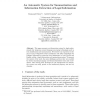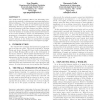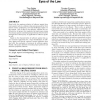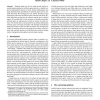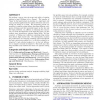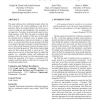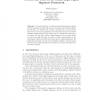LREC
2010
14 years 1 months ago
2010
Abstract. This paper presents an information system for legal professionals that integrates natural language processing technologies such as text classification and summarization. ...
ICAIL
2007
ACM
14 years 2 months ago
2007
ACM
The “small world”-paradigm offers a new interesting viewpoint for the analysis of contemporary legal networks and artificial intelligence. This topological approach sheds fu...
ATAL
2008
Springer
14 years 2 months ago
2008
Springer
Faced with the ongoing evolution of software agents from mere passive tools to e-tailers acting autonomously for their human owners (principals), new legal challenges appear on th...
ECAI
2004
Springer
14 years 4 months ago
2004
Springer
Thinking about how the law might decide whether to extend legal personhood to artificial agents provides a valuable testbed for philosophical theories of mind. Further, philosophic...
ICAIL
2007
ACM
14 years 4 months ago
2007
ACM
Ontologies in a legal expert system must be processed to suit all possible user cases within the field of law of the system. From the logical premises of a deductive system of expr...
ICAIL
2007
ACM
14 years 4 months ago
2007
ACM
We perform a survey into the scope and utility of opinion mining in legal Weblogs (a.k.a. blawgs). The number of `blogs' in the legal domain is growing at a rapid pace and ma...
ICAIL
2009
ACM
14 years 5 months ago
2009
ACM
We propose an analysis of the codified Law of France as a structured system. Fifty two legal codes are selected on the basis of explicit legal criteria and considered as vertices ...
SIGDOC
2004
ACM
14 years 5 months ago
2004
ACM
This paper addresses how intellectual property affects the Web in general, and content publishing on the Web in particular. Before its commercialization, the Web was perceived as ...
ITRUST
2005
Springer
14 years 6 months ago
2005
Springer
Abstract. The early adoption of a national, legal digital signature framework in Italy has brought forth a series of problems and vulnerabilities. In this paper we describe each of...
